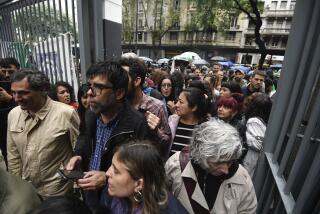Argentina Is Paying Price for Austerity : Government Satisfied With Results to Date; Many Bankers Aren’t
BUENOS AIRES — The big Ford plant on the outskirts of this capital made about two dozen cars and trucks last week. It was a noteworthy figure in a country where strains are showing in a national struggle to control runaway inflation.
Production stopped at Ford’s General Pacheco plant on June 26. Last week, the assembly line rolled briefly--despite protests from absent Ford executives--in a gesture of defiance by about 4,000 workers who occupied the plant for nearly 3 weeks. The workers bowed to a court order and abandoned the plant before dawn Sunday.
Loudest Backfire
The peaceful but illegal Ford takeover, triggered by the firing of 33 workers for chronic absenteeism, has been the loudest backfire in a month of unprecedented national austerity.
In mid-June, in a Draconian attempt to stem inflation running at 1,000% per year, the government froze wages and prices, created a new currency and vowed not to print new money for money-losing state enterprises.
There have been some signs of impatience, but the government of President Raul Alfonsin says it is satisfied with the interim results of the austerity plan, which has enjoyed strong popular support. Inflation, which was 30% in June, is predicted to be about 7% for July.
“In general terms, there is no fall in production or any alarming increase in firings or unemployment,” asserted Interior Minister Antonio Troccoli. “Everything is going reasonably well, except for some obstacles which we have to manage in the best possible way.”
Different Assessment
Businesmen and bankers, however, dispute Troccoli’s analysis. They report a marked slowing of an economy already deep in recession. The National Statistics Institute has reported a sharp decline in demand for workers.
Over the protests of some exporters hard-pressed to retain their markets, the central bank has maintained the new currency, called the austral, at 0.80 to $1 U.S., while retaining exchange controls.
On the free market, the austral has slipped over the past two weeks, closing at about 0.97 to the dollar Friday.
Peronist-controlled labor unions complain that real income has fallen dramatically, with wages frozen and rates for staples and public services hiked sharply not long before the reform was adopted.
Price controls have brought complaints of shortages in some areas, and government inspectors have punished several hundred businesses around the country for profiteering by forcing them to close their businesses for 72 hours.
Labor Unrest
In addition to the Ford strike, the government is faced with labor unrest among railway workers, bank employees and workers at paper mills. Workers briefly seized a major appliance factory, and one of several small banks closed by the government is being occupied by its workers.
Convinced that the reform is working but needing also to preserve labor peace, the government is requiring all businesses to consult with the labor ministry before ordering layoffs or firings.
As a complement to the plan, the government is seeking new foreign investment in such areas as oil and telephones, and it is eager to divest some of its money-losing enterprises.
Also under consideration, as the second month begins of what Alfonsin calls a “war economy,” is a tax on tourists traveling abroad that is intended to deter the flight of badly needed foreign currency.
More to Read
Sign up for Essential California
The most important California stories and recommendations in your inbox every morning.
You may occasionally receive promotional content from the Los Angeles Times.










